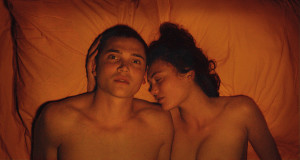 Missed Madison Film Festival
Missed Madison Film Festival
Love | Gaspar Noé | France | 2015 | 135 minutes
Netflix | GoWatchIt
Emily Caulfield argues that Gaspar Noé’s latest provocation is just as messy and alive as anyone in love in their twenties.
Gaspar Noé’s Love is just like life: exhilarating, sad, weird, sentimental, and full of dicks.
It’s a tale as old as time: boy filmmaker goes to Paris to study, meets incredibly hot French art student (named Elektra for god’s sake), and they embark on a no-holds-barred sexual odyssey together that’s eventually their undoing. Move over, Bernardo Bertolucci’s The Dreamers, there’s a new weirdo European sex romp in town.
But actually, it’s not so weird.
American film student Murphy, played endearingly by Karl Glusman, wants to be a director. That’s reasonable. His walls and floors are papered with posters, littered with books: M, Hollywood Babylon, Taxi Driver. Both in form and content, Love calls forth an entire landscape of films, with as many peaks as there are valleys, from Tod Browning’s 1932 masterpiece Freaks to Troma Studios productions.
Murphy meets the beautiful and troubled Elektra, played by newcomer Aomi Muycock, who’s at once maddeningly French and soft and pliable and begging to plowed, and yet also a venomous razor-toothed hell demon from Mars.
Love, which moves back and forth in time, taking place largely inside Murphy’s opium-addled head, feels exactly like falling in love at twenty. It’s a romance-cum-sci-fi-horror movie, chock-a-block full of tears and viscera, as gravity-defying, and then as leaden, as it is when you are young and you have complete and utter access to a someone you love and need, lust after and hate. Noe’s signature surreality is absolutely necessary here: color codes and clever framing; meticulously pointed set decor and poetic editing; repeated words and gestures. Each detail carves out a highly urgent, emotionally and sexually charged melodrama that everyone, barely legal threesome notwithstanding, immediately recognizes as their own experience.
Because isn’t that essentially how we all feel? The sexy stars in our own Hollywood blockbuster? Yea, these people are hot, and they’re hanging around sex parties in Paris. But other than that, they’re not special.
Murphy’s favorite movie is 2001. Elektra’s favorite poet is Robert Frost. They pretend to read each other’s palms. Their neighbor reveals she’s pro-life. Someone’s depressed, another’s trapped. Awkward conversation at galleries, awkward assignations at parties. These banal details underline Love‘s verisimilitude with real life: these dummies are just like us, (except young and beautiful and sexually fearless). But you know it when you see it: this is love.
It’s certainly how Noé feels. It’s no secret that Love is Noé’s passion project; it’s been in the works since before Irreversible (2002). And, I believe, the film is all the more potent for it. Love is an Inception-style mise en abyme that finds richness and strength from its various permutations of the same story, themes, characters. It’s as if Noé dumped all his feelings and tricks into a crockpot circa 2001 and let them simmer for a decade, then turned that bitch out and it’s the best pot roast you’ve ever tasted.
Like all intense young male filmmakers, and like Noé himself, clearly, Murphy wants to make films “that depict sentimental sexuality…of blood, sperm, and tears…this is the essence of life; movies should contain that, or be made of that.” In Love, this is just what Murphy does: love and lust and his young ambition intertwined; when your whole bloody life is your sexy French girlfriend. Her, topless on your camera, under the French flag. Her, in her glasses with her paintbrush. Her, soft lips apart, buck teeth bared, asleep. Your work is a bundle of hair and nerves and strands of spit: the throbbing ball of energy hormones and melodrama that comes with all life, and love, at twenty-one.
And Noé does make a film of blood, sperm, and tears. Reportedly, the unsimulated sex and 3-D format scandalized even some Europeans (Gasp! A wiener in me eye!).
One of the best reasons to see this movie: Noé’s carefully choreographed sex scenes are successfully hot and, amazingly, successfully sentimental. But beyond the sex and all its juices, his transparency in the film is more distanced, more nuanced, in winks and nods and names, but it’s still as effective, and as provocative, as slicing up your navel, pulling your greasy guts out and splattering them right on the film.
Love is beautiful, lit and composed within an inch of its life, yet still as natural as breathing, bleeding, fucking, weeping, coming, or giving birth. It’s a film I’m grateful to have seen, that I’ll think about as much as my own youth in love. I’ll surely think of it for nights, or years of nights, to come.